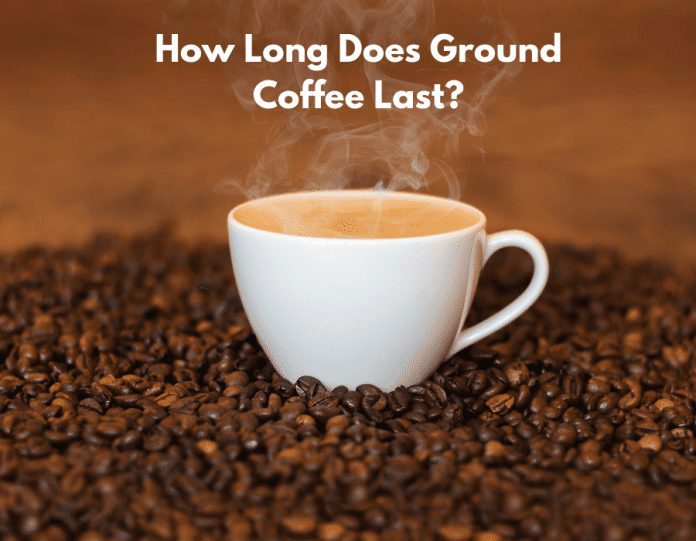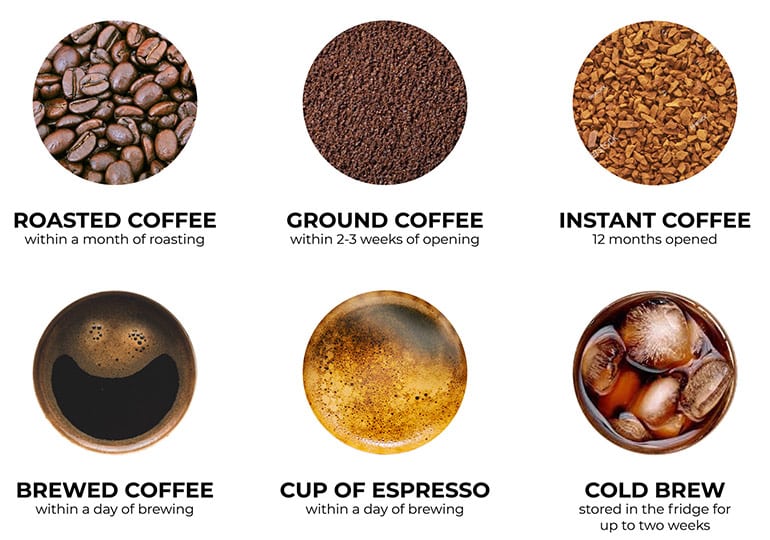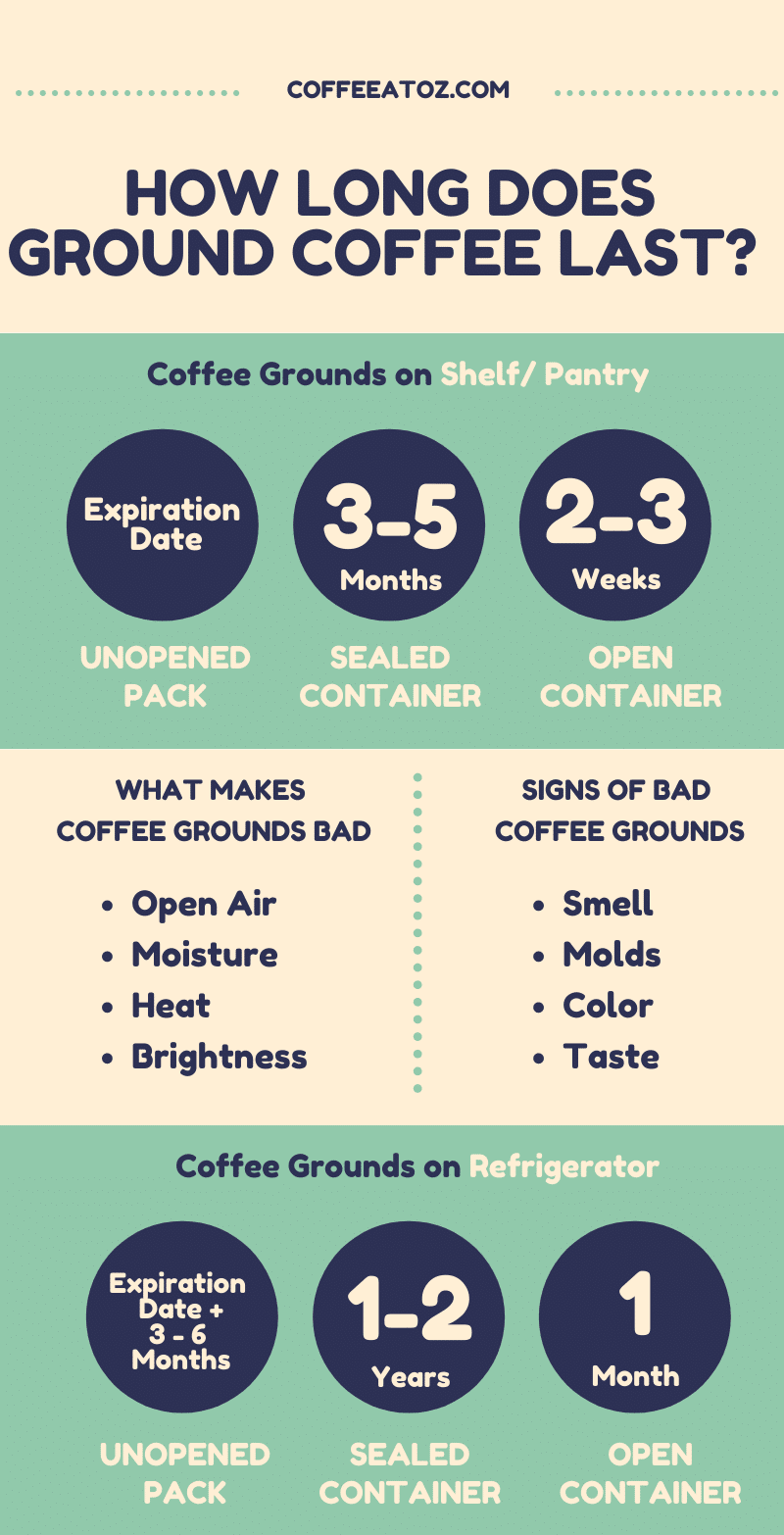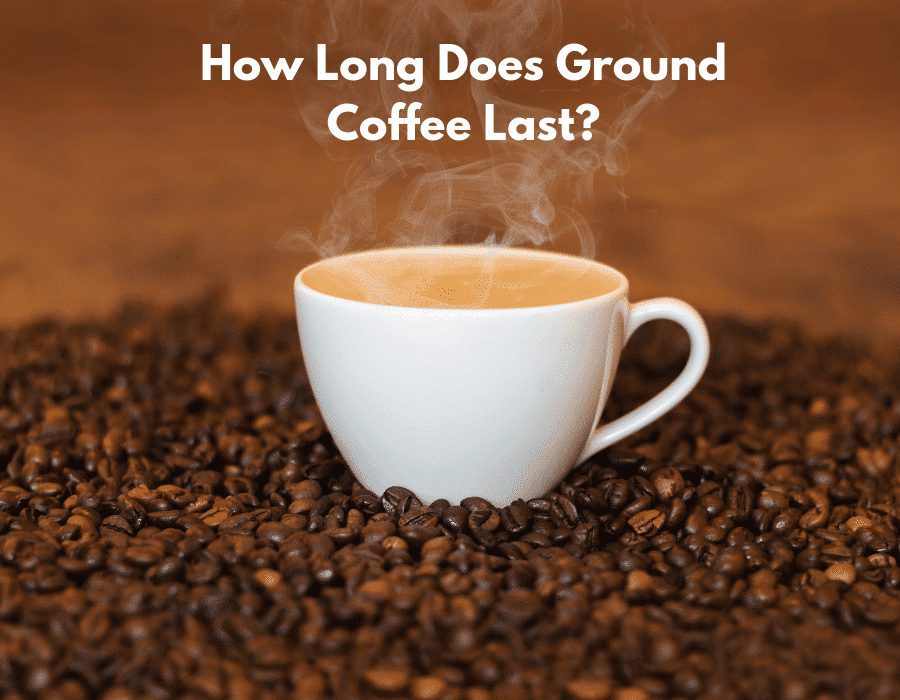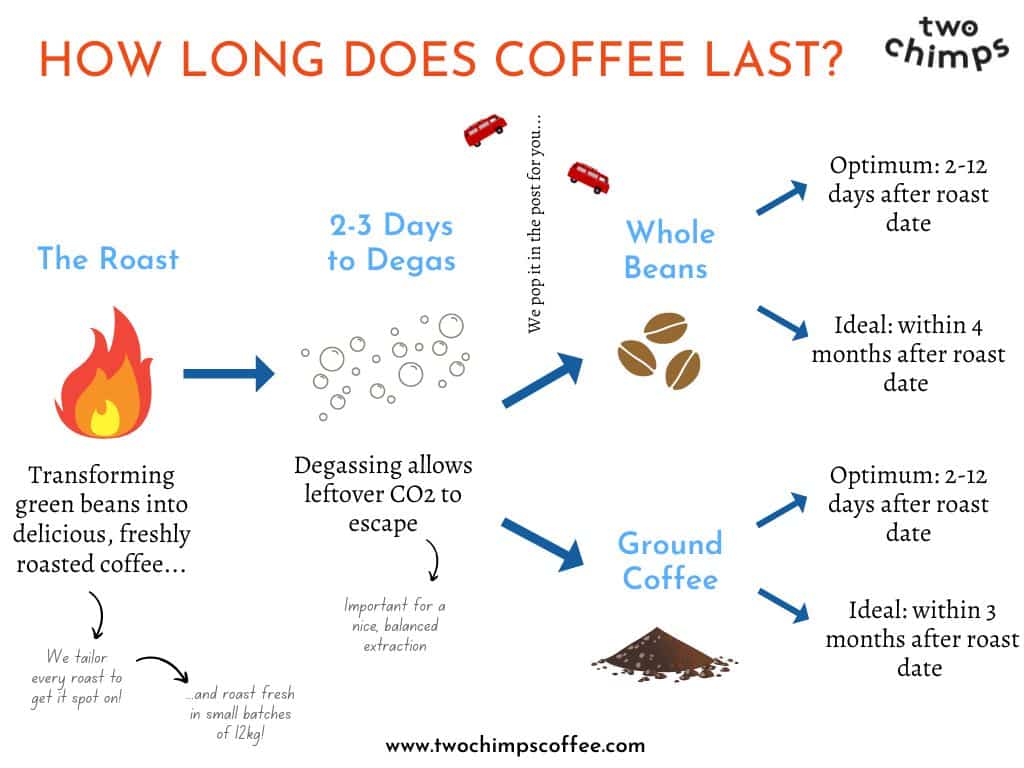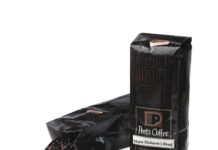Coffee lovers unite! We all know that there’s nothing quite like the aroma and taste of a freshly brewed cup of joe to jumpstart our mornings. But have you ever wondered how long that bag of ground coffee will last before it starts to lose its flavor? In this article, we’re going to spill the beans and reveal the secrets of coffee longevity. So sit back, grab your favorite mug, and prepare to have your caffeine-related questions answered.
This image is property of www.coffeefriend.co.uk.
Factors That Affect the Shelf Life of Ground Coffee
Storage Method
The way we store our ground coffee has a significant impact on its shelf life. To keep it fresh for as long as possible, it is crucial to store it properly. An airtight container is the best option, as it helps protect the coffee from moisture, air, and light. Additionally, it is essential to store the container in a cool, dark place away from any odorous substances that could taint the coffee’s flavor.
Type of Packaging
The packaging of ground coffee also contributes to its shelf life. Coffee that comes in vacuum-sealed or cans with airtight lids tends to have a longer lifespan compared to coffee packaged in bags with a simple resealable closure. The packaging plays a vital role in preventing the coffee from coming into contact with moisture and oxygen, which can accelerate its deterioration.
Quality of Beans
The quality of the beans used to make the ground coffee has a direct impact on its shelf life. Higher-quality beans tend to have a longer shelf life due to their natural oils and flavors being more preserved. In contrast, lower-quality beans may have a shorter shelf life as they are more susceptible to degradation and flavor loss.
Environmental Factors
Various environmental factors can affect the shelf life of ground coffee. Excessive heat and humidity can cause the coffee to spoil more quickly, while cooler temperatures help preserve its freshness. Additionally, exposure to air, light, and odors can accelerate the degradation of the coffee’s flavor and aroma.
Roast Level
The roast level of the coffee beans used to make ground coffee can also influence its shelf life. Lighter roasts tend to have a shorter shelf life as their flavors and aromas are more delicate and prone to degradation. On the other hand, darker roasts have a more robust flavor profile that can last longer. However, it is essential to note that even darker roasts will eventually lose their freshness over time.
Understanding Coffee Shelf Life
Expiration Date vs. Freshness
While ground coffee typically comes with an expiration date, it is important to understand that this date primarily indicates when the coffee is no longer at its peak freshness. Ground coffee can still be consumed after the expiration date, but its flavors and aromas may have diminished significantly. To truly savor the optimal taste of coffee, it is best to consume it within a reasonable period after the roast date.
Degassing Process
After coffee beans are roasted, they undergo a degassing process. This process involves the release of carbon dioxide, which is a byproduct of the roasting process. During degassing, coffee beans emit gas for several days, and ground coffee is no exception. It is important to allow for this degassing process as the carbon dioxide can negatively impact the freshness and flavor of the coffee. Letting the coffee sit for a few days before storing or using it will help ensure a better-tasting cup.
Optimal Flavor Period
Ground coffee is at its best, flavor-wise, for a certain period after the roast date. This optimal flavor period typically ranges from two weeks to one month, depending on various factors such as the roast level, storage conditions, and packaging. During this period, the coffee retains its full complexity, aroma, and taste profile. It is recommended to consume the coffee within this period to experience the true essence of its flavor.
Signs of Ground Coffee Going Bad
Aroma Changes
One of the most noticeable signs that ground coffee has gone bad is a change in its aroma. Freshly roasted and ground coffee should have a strong, pleasing aroma that stimulates the senses. However, if the coffee smells off, musty, or stale, it is an indication that it has started to lose its freshness and is no longer suitable for consumption.
Visual Indicators
Visual cues can also help determine if ground coffee has deteriorated. If it appears clumpy, moldy, or discolored, it is a clear sign that the coffee has gone bad. Fresh coffee should have a consistent, uniform appearance, and any visual abnormalities suggest that something is amiss.
Taste Deterioration
The final and most critical indicator of ground coffee going bad is its taste. When brewed, fresh coffee should have a rich, flavorful taste that showcases the nuances of the beans. However, if the coffee tastes bitter, flat, or dull, it has likely passed its prime. Drinking coffee that has gone bad can result in a disappointing, lackluster experience.
Storing Ground Coffee for Longevity
Proper Storage Containers
To extend the shelf life of ground coffee, it is crucial to store it in the right type of container. Opt for an airtight container, preferably made of ceramic or glass, with a secure lid. Avoid using plastic containers as they may impart unwanted flavors to the coffee. The container should be specifically designed for storing coffee, with minimal air exchange and protection against external elements.
Ideal Storage Conditions
The ideal storage conditions for ground coffee involve cool and dark environments. Heat and light can accelerate the degradation of coffee’s flavors and aromas, so it is best to store it away from direct sunlight or heat sources such as stoves or ovens. A pantry or cupboard away from the kitchen’s heat is an excellent choice for prolonging coffee’s freshness.
Avoiding Moisture
Moisture is one of the biggest enemies of ground coffee, as it can cause the coffee to spoil quickly and develop mold. It is essential to keep the coffee away from humid areas such as the refrigerator or near the sink. Moisture can be absorbed by the coffee, resulting in a loss of flavor and aroma.
Minimizing Exposure to Air
Exposure to air is another factor that can accelerate the degradation of ground coffee. When in contact with oxygen, the coffee’s natural oils and flavors begin to break down, leading to a stale taste. Keeping the container tightly sealed and minimizing the amount of time the coffee is exposed to air can help preserve its freshness for longer.
Avoiding Direct Sunlight
Direct sunlight can cause ground coffee to deteriorate rapidly. UV rays from the sun can break down the coffee’s compounds and contribute to flavor loss. It is essential to store the coffee in a dark place and avoid exposing it to direct sunlight. If the container is transparent, consider placing it inside a cupboard or drawer to shield it from light exposure.
This image is property of i.pinimg.com.
Extending the Lifespan of Ground Coffee
Freezing Ground Coffee
Freezing ground coffee is a popular method for extending its shelf life. However, it is essential to take proper precautions to prevent moisture from damaging the coffee. Divide the ground coffee into smaller portions and store each portion in an airtight container or bag. When you need to use the coffee, remove the desired portion from the freezer and allow it to come to room temperature. Avoid frequent thawing and refreezing, as this can lead to moisture absorption and affect the coffee’s quality.
Vacuum Sealing
Vacuum sealing is another effective method to prolong the lifespan of ground coffee. It involves removing the air from the package or container to create a vacuum seal, preserving the coffee’s freshness and flavor. Vacuum-sealed coffee can stay fresh for an extended period, but it is crucial to ensure that the seal remains intact to prevent air from entering and compromising the coffee’s quality.
Using Oxygen Absorbers
Oxygen absorbers, also known as O2 absorbers, can be used to remove excess oxygen from the coffee container, further prolonging its shelf life. These small packets contain iron powder that reacts with oxygen, effectively reducing its presence in the package. By minimizing oxygen exposure, the coffee’s flavors and aromas can be preserved for a longer time.
Best Practices for Using Expired Ground Coffee
Creative Uses for Expired Ground Coffee
While expired ground coffee may not be suitable for brewing a delicious cup of coffee, it can still find purpose in various other ways. For example, it can be used as a natural exfoliant for the skin, added to compost or fertilizers to enhance plant growth, or used as an odor neutralizer in the refrigerator or garbage disposal. Get creative and find innovative ways to repurpose expired coffee instead of letting it go to waste.
This image is property of www.baristadelcaffe.co.uk.
Frequently Asked Questions (FAQs)
Can ground coffee go bad before the expiration date?
Yes, ground coffee can go bad before the expiration date, especially if it is not stored properly. Factors such as exposure to air, moisture, heat, and sunlight can cause the coffee to deteriorate and lose its freshness more quickly.
How long does ground coffee last after opening?
Once opened, ground coffee typically retains its freshness for about two to four weeks. However, this may vary depending on the storage conditions and the type of packaging used. It is important to consume the coffee as soon as possible after opening to enjoy its full flavors.
Does grinding fresh beans extend shelf life?
Grinding fresh coffee beans does not extend the shelf life of the ground coffee. In fact, it can accelerate the deterioration process as the coffee is exposed to air, allowing more oxygen to come into contact with the coffee’s oils and flavors. It is best to grind beans just before brewing for optimal freshness.
Can I use expired ground coffee for cold brew?
Yes, expired ground coffee can still be used for cold brew. Since cold brewing involves steeping coffee grounds in cold water for an extended period, it can help mask any stale flavors that may have developed. However, it is important to note that the resulting cold brew may not have the same vibrant flavors as fresh coffee grounds.
Conclusion
The shelf life of ground coffee can be influenced by various factors such as storage method, type of packaging, quality of beans, environmental factors, and roast level. Understanding the degassing process, optimal flavor period, and signs of coffee going bad can help us determine the freshness of our ground coffee. By storing it in proper containers, ideal conditions, and minimizing exposure to air, light, and moisture, we can extend its lifespan. Freezing, vacuum sealing, and using oxygen absorbers are effective methods for preserving ground coffee. And even if the coffee has expired, we can explore creative ways to repurpose it. By following these tips and guidelines, we can maximize the enjoyment of our ground coffee and experience its full flavor potential.
This image is property of twochimpscoffee.com.


